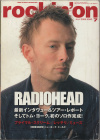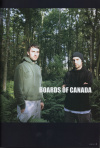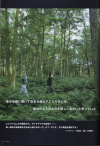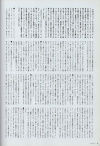| title
|
The Essence Of Their Artistry
|
| author
|
Takanori Shiba
|
| publication
|
rockin'on
|
| date
|
2006/07
|
| issue
|
7
|
| pages
|
72-75
|
The Essence Of Their Artistry was an interview (in Japanese) by Takanori Shiba originally published July 2006 in rockin'on magazine issue 7 pp. 72-75.
Original Text
This is an original text copied verbatim from the original source. Do not edit this text to correct errors or misspellings. Aside from added wikilinks, this text is exactly as it originally appeared.
Note: Transcription by Apple's Live Text on a MacBook Pro
BOARDS OF CANADA
音が空間に響いて空気を揺らすことで生じる、
魔法のようなものを閉じこめたいと思っている
エレクトロニカの極北から、サイケデリアの至宝へー。
唯一無比の音風景を生み出し続けるボーズ・オブ・カナダ、その真髄を解析する!
インタヴュー:柴那典通訳:長沢朋子
昨年10月にリリースされたBOCの『ザ・キ
ャンプファイア・ヘッドフェイズ』は、とても
不思議な感触を持ったアルバムだった。何しろ、
半年経った今聴いても、初めて耳にした時の感
触から全く色褪せていないのである。いや・・・・・・
より正確に言うなら、最初に聴いた時に「すでに完璧に色褪せている」サウンドだったのだ。
彼ら曰く「普通のポップ・アルバムが太陽に20年間さらされたような感じ」。生楽器を多用し、それを丹念に加工してアナログなヴィンテージ
感を生み出し、それによって、微妙な揺らぎと柔らかなぬくもりに満ちたサウンドスケープを作り出す。だから、まるで「架空の過去」に誘い込まれるような、幻想的なサイケデリアに包まれる。こんな音の作り方をしているアーティストはほかにいるだろうか?エレクトロニカの界隈のアーティストとして捉えられることの多いBOCだけれど、最早その枠組みは完全に超えている。いわば、インストウルメンタル・ミュージックの一つの到達点となるアルバムだった、とさえ思う。
このたびリリースされたEP『トランス・カナダ・ハイウェイ』は、昨年からリリースが計画されていたもので、いわばアルバムの続編的な内容。アルバムでも屈指のポップネスを持っていた一曲"Dayvan Cowboy"と、『ジオガディ』以前の彼らを彷彿させるエレクトリックな新曲4曲を収録している。このEPを機に、アルバム『ザ・キャンプファイア~』、そして彼らの音楽の根核となっている感覚までを掘り下げて、メールで訊いてみた。
●EP『トランス・カナダ・ハイウェイ』は、アルバム『ザ・キャンプファイア・ヘッドフェイズ』と地続きのテイストながら、新たなイメージの広がりを感じるEPですね。単なるシン
グル・カットのようなものとは違う意味合いを持つEPだと思うんですが、あなたにとってはどういうものを作れたという手応えがあります
か?
マイク「去年、アルバムの仕上げに入った時点で、この後すぐにEPをリリースしようと決めたんだ。そのときも新曲を書き続けていたからね。それで、シングルをリリースする話が出たときに、それならシングルじゃなくてEPにして、新しい曲もいくつか聴いてもらえるようにしようと、こちらから提案したんだ。このEPでは、アルバムで繰り広げた旅の続きという雰囲気を出したかった。アルバムに入っていた曲で幕を開けて、徐々にもっと冷ややかなモードへと移っていく、という。だから、『トランス・カナダ・ハイウェイ』というタイトルは、あのアルバムの『車での長旅』というテーマと地続きでつながっているんだ。本物のトランス・カナダ・ハイウェイ(カナダ横断道路)はたしか世界でいちばん長い道のはずだから、冒険を進めていく道としてはぴったりじゃないのかな」
●EPの新曲はアルバムよりエレクトロニックな作りになっていると思うんですが、アルバム以降こうしたモードに変化してきた理由は?
マーカス「レコードを作るときはいつも、何かしら一貫したテーマ、あるいはフレイヴァーのようなものを持たせようとしている。今回の場合は、それが素朴な味わいのギターや、メジャーコードを多用したコード進行だった。僕たちの場合、レコードによって発想の根本そのものが変わっていくことはあまりなくて、そのときに感じている気分を、的確に表現するレコードを作ろうとしているからね」
●では、4つの新曲はどのようなものにインスパイアされてできたのでしょう?
マイク「たぶん、あのときは『ザ・キャンプフ
アイア〜』の後で、あそこまで濃密だったり、重層的だったりしないものが作りたいというだけだったと思う。あのアルバムの曲はすごく込み入ったものばかりだったからね。それに比べると、今度のEPに入れた新曲は、どれも僕たちのごく初期の作品に近いものになっている。
あのアルバムよりミニマルだし、空間のあるサウンドと言えるんじゃないのかな」
●では、アルバムからの曲で"Dayvan Cowboy"を選んだのは何故?この曲が突出しているポイントはどこにあるんでしょうか?
マーカス「僕たちが今までリリースした中でも、もっともポップ・ソング的な構造を持つ曲だね。
かなりパンチのあるポップ・トラックという意味で、僕たちの今までの作品でも突出した存在なんだ。特に、後半の劇的な展開で、曲がどんどん盛りあがっていくところがね。アルバムができあがったときは、『この曲をシングルにするべきだ』って、ずいぶん言われたよ。普段の僕たちだと、わかりやすいコード進行がある曲はすごく少ない。けれど、この曲は特別で、完成したとき、WARPはこの曲をとても気に入って、これはぜひシングルにすべきだと言ってきたんだ。それで僕たちも「しかたないな、別にいいよ』
と返事をしたんだけど」
●"Dayvan Cowboy"では初のPVも作成しましたよね。もともとBOCの音楽の成り立ち自体が映像と非常に関連があるものだったので、これが初のPVというのも意外な気がしたんですけれども。
マイク「あのビデオは自分たちで作ったんじゃないんだ。大予算で最新のヴィジュアルを作るノウハウを僕たちよりずっとよく知ってる友達がいて、その人がやってくれたんだよ。でも、向こうからあの曲のビデオを作りたいという話が来たとき、僕たちは『いいよ、ただし、何も
かもが本当にミニマルで、DIYで、安くないとだめだからね!』と言ったんだ。僕たちはずっと前から、自分たちで映像も作ってきて、その一部をライヴやイベントで使ってきたけれど、特定の曲に合わせたビデオは一度も作ったことがなかった。そのいちばんの理由は、ビデオを作ると、音楽から何かが損なわれてしまうと思っていたからなんだ。インストウルメンタル・ミュージックには独特の魔法みたいなものがあって、それはヴィジュアルがつくとだめになってしまう。だから、ビデオを作ることにはずっと反対だったんだ。でも、今回に限って言えば、サウンドそのものがすでに"ポップ"なわけだから、ビデオを作ったからって特に何かが失われることもないと踏んだんだ」
マーカス「僕たちは70年代の映画やドキュメンタリーをこよなく愛しているのだけれど、このビデオを作ってくれた友達も、同じくらいそういうものが好きなんだ。たとえば、70年代のサ
1フィンを追ったドキュメンタリー、『crystalVoyager』とかね。実際、何年か前には、ああいうスタイルでミュージック・ビデオを作れたら最高だろうね、という話をしたこともあった。
それで去年、アルバム用に"Dayvan Cowboy"を完成させたとき、これが僕たちなりの『サーフィン賛歌』だという手応えがはっきりあったので、前のアイディアが再浮上してきたわけなんだよ」
●前のタイミングで取材できなかったんで、アルバム『ザ・キャンプファイア〜』についても訊きたいんですけれども。このアルバムは生楽器を多用して、まさに古い映画のような質感を持つサウンドで占められていましたよね。『ミュージック・ハズ・ザ・ライト・トゥ・チルドレン』とも『ジオガディ」とも違う方向性だったと思うのですが、まずそういうアプローチを
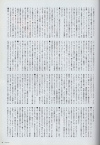
とる必要性はどこに感じていたんでしょう?
マイク「最初の2枚で表現したサウンドは、僕たちの取り組んできたことの一面にすぎないし、実際、『ミュージック~』をリリースする前まではずっと、ギターやアコースティックな楽器を使った音楽をたくさん書いていたんだ。あのアルバムと、それに続く『ジオガディ』は、僕たちの作品としては初めて世界規模でリスナーの耳に触れたものだったので、ボーズ・オブ・カナダといえばこの2枚のようなエレクトロニック・サウンドで、これ以外の要素はないと早合点されてしまったんだと思う。でも、僕たちに言わせれば、これはあくまでひとつの側面にすぎないんだ」
●『ジオガディ』以降のBOCにはエレクトロニカ/ラップトップ・ミュージックの代表格のようなイメージができたと思うんですが、そういう括りを窮屈に感じていた面はありました?
マイク「何とも言えないな。あるシーンの代表格、と言われるのは、それがどんなシーンであれ、非常に光栄でもあるけれど、そこに落とし穴がある、とも言えるからね。ただ、ラップトップ・シーンの代表格、という呼び名にはまったく納得できない。僕たちは音楽を作るのに、ラップトップはまったく使っていないからね。それには無理があるよ。僕たちのレコードに入っているサウンドは、何らかのかたちで実際の楽器を使って演奏して、僕たち自身がマイクで収録したものが大部分なんだ。最終的にサンプラ
1に収められるとしても、その前に一度、その音が空間に響いて空気を揺らすことで生じる、何か魔法のようなものを閉じこめたいと思っている。だから、僕たちのレコードの中でいちばん人工的な音でも、込み入った手法を駆使して、僕たち二人が完全に人力で作りあげたものなんだ」
●実際、『ザ・キャンプファイア〜』でのサウ
ンド、特にギターの音には60年代のクラシックなロックや90年代のシューゲイザー・バンドを感じさせるような、ざらついた乾いた感じがあると思います。そういう色褪せたヴィンテージ感のあるものをやろうと思った動機は?イマジネーションの源泉になったものはあります?
マイク「実はこのアルバムは、タイトル通り、キャンプファイアの場面を想像しながら作ったんだ。何人かの友達と一緒に、たき火を囲んでいるというイメージだね。僕たちは最近、昔のレコードをたくさん聴いていたんだ。アーティストの名前で言うと、ドノヴァンやジョニ・ミッチェル、ゴールデン・アバター、ジョン・ケイル、キャプテン・ビーフハートとか。だから、あのアルバムでは、展開されるメロディは僕たち独特のものだけれど、サウンドや音の感触は、今名前を挙げたようなアーティストによる昔の名作の雰囲気もにおわせているんだよ」
●では、振り返ってみてあのアルバムで成し遂げたことは何がいちばん大きいと思いますか?
マイク「たぶん、このアルバムは今後、独特のフレイヴァーを持った作品としてとらえられることになるだろうね。まるで夏のような前向きなムードがあって、そこが僕たちのほかの作品とは大きく違う。僕たちは、アルバムを作るごとに、前とは違った新鮮な気分を表現したいと思っている。これから先、さらに何枚かアルバムを作ってからこのアルバムを振り返ったときに、誰もいない海岸に座ってぼんやりと記憶を思い返しているときに聴きたくなるようなアルバムになっていたらいいんだけれど」
●では、BOCの音楽全般についても訊こうと思うんですが。BOCの音楽には、どのアルバムや作品をとってみても、一般的なロックやポップス、またテクノやエレクトロニカとも構造の違う独特のサイケデリアがありますよね。こ
ういうサウンドを生み出せているのは、二人のどんな資質によるものなんでしょう?
マイク「僕たちは、はっきりとした構成を持つポップ・ソングと、抽象的で明確な構成のない実験的な音楽の間の、微妙な境界線を歩いている。だから僕たちの曲には、ヴァースやコーラスがあって、メロディにもフックがある、ふつうのポップ・ソング的なものもあるけれど、そうしたものでも、どこか落ち着かない、あるいはこういう曲にはふさわしくないように思える要素を、意識的に織り込んでいる。2つの曲を同時にかけてみたら、違う要素がうまく衝突して、どっちの曲とも違う、よりよい音楽ができるような感じだね。それ以外の部分は、僕たちの音楽は、えんえんと鳴り続ける単調な音や、何が何だかわからない、不思議な環境音で満たされている。ありきたりの音楽を、断片化して、ゆがんだやり方で再現するという、そこがとても好きだね。僕たちがめざしているのは、わかりやすい、今までのポップ・ソングと何も変わらないものをテーマとしながら、それを文字通り壊したりひねったりしてみて、ふつうのポッ
予想外のものにしてくことなんだ」
●自分たちの発想がほかのロック・バンドやエレクトロニック・アーティストと違うと思う面はどんなものがありますか?
マイク「何とも答えにくい質問だね。自分が頭の中で考えていることしか、僕にはわからないから。僕たち二人は、今のロックやエレクトロニック、あるいはポップ・ミュージックの世界で、自分たちの音楽が一角を占めているとは思っていないんだ。曲を書いているときは、自分たちのいる、閉じた世界の外をいつも想像している。まるで、僕たちの作っている作品が、ほかの人が今聴いているものとは違う世界から来 ているような感覚だね」
●また、特筆すべきはメロディやハーモニーの美しさでもあると思います。リスナーはそれぞれそのメロディから切なさや幻想性や寂しさや心地よさを受け取っていると思うのですが、あなたが音楽を作るときにそれらの感情を込めている、という感覚はある?
マイク「もちろん。それが、BOCをやっているそもそもの目的だからね。シンプルな音の連なりを奏でるだけで、聴いた人が何かとても深いことを悟ったり、ひどく悲しい気分になったりする、そこに僕はたまらなく心惹かれる。そこにはものすごい力があって、錬金術みたいだとさえ思うよ」
●では、あなたが音楽以外で「美しい」と思うものは?それを音楽のかたちで表現してきたという感覚はあります?
マイク「音楽の中にある"悲しさ、はとても美しい。そして、楽しく聞こえるけれど、その根底にはかすかな悲しさが流れているような、そういうメロディを作り出せたら、それは本当の不柄の傑作と言えるだろうね。僕がいつも、悪戦苦闘しながらめざしてるのも、そこなんだ」
●では、最後の質問。もし「これができたらB
0Cを止めてもいい!」と思えるような最終目標があったら、教えてください。
マイク「そこが問題なんだよ。ギリシャ神話のタンタロスの話(※果物の木や泉がそばにあるのに、手を伸ばすと両方とも遠ざかってしまう罰を受けた残忍な王の話)と一緒で。いつの日か僕たちは完璧な音楽を作り出すんじゃないか、という感覚はある。今まで聴いたどんな音楽よりも美しくて、胸を締め付けるような、そういう曲を。でもひょっとすると、そこにたどり着こうと努力をしているうちに、一生を終えてしまう運命なんじゃないかという気もするんだ」
Translated Text
Note: Translation by ChatGPT-o4
BOARDS OF CANADA
From the farthest reaches of electronica to the treasures of psychedelia—aiming to capture something magical, born from sound resonating in space and vibrating the air. Boards of Canada continue to create a unique sonic landscape like no other. Here, we delve into the essence of their artistry!
Interview by: Takanori Shiba
Translation by: Tomoko Nagasawa
Released last October, Boards of Canada's The Campfire Headphase was an album with a truly unique feel. Even six months later, listening to it still evokes the same vivid impression as the first time. Or, to put it more accurately, the sound was 'already perfectly faded' right from the first listen.
As they described it, it's like 'a regular pop album that's been left out in the sun for twenty years.' They make extensive use of live instruments, carefully processed to create an analog vintage feel, which produces a subtle shimmer and soft warmth within the soundscape. This wraps listeners in a fantastical psychedelia that feels like being drawn into an 'imaginary past.' Are there any other artists creating sounds in this way? While Boards of Canada are often categorized as electronica, they have completely transcended that boundary. One could even say this album marks a milestone in instrumental music.
Their latest release, the Trans Canada Highway EP, was planned for release since last year and can be seen as a kind of sequel to the album. It includes "Dayvan Cowboy", one of the album's most accessible tracks, along with four new electric tracks reminiscent of their work before Geogaddi. Through this EP, we took the opportunity to explore The Campfire Headphase album and the core of their musical sensibility through a written interview.
Q: EP
Trans Canada Highway has a similar vibe to the album
The Campfire Headphase, but it also feels like it's expanding into a new image. I feel like this EP has a different meaning than just a single cut from the album. How does it feel to have created something like this?
Mike: When we were finishing up the album last year, we decided to release an EP right afterward. We were still writing new songs at the time, so when the topic of releasing a single came up, we suggested making it an EP instead so we could share some of these new tracks. With this EP, we wanted to convey the sense of continuing the journey we started in the album. It begins with a track from the album and gradually shifts to a cooler, more detached mood. That's why we titled it
Trans Canada Highway, as it connects to the album's theme of a 'long road trip.' The real
Trans-Canada Highway is, I believe, the longest road in the world, so it felt fitting as a road of ongoing adventure.
Q: The new tracks on the EP seem more electronic than those on the album. What led you to this shift after the album?
Marcus: When we create a record, we always try to infuse it with a consistent theme or flavor. In this case, that flavor was raw-sounding guitar and chord progressions heavy on major chords. For us, the fundamental inspiration behind each record doesn't change much; we're just trying to make a record that accurately reflects how we're feeling at that moment.
Q: What inspired the four new songs on the EP?
Mike: I think, after
The Campfire Headphase, we simply wanted to create something that wasn't as dense or layered. The tracks on that album were quite intricate, so in comparison, the new songs on this EP are closer to
our earliest work. They're more minimal and have a sound with more open space.
Q: Why did you choose "
Dayvan Cowboy" as the track from the album? What makes this song stand out?
Marcus: It's one of the most pop-structured songs we've ever released. It's a punchy pop track and really stands out from our other work for that reason. Especially with its dramatic buildup in the second half, where the song intensifies. When we finished the album, we got a lot of feedback suggesting 'this should be the single'. Normally, we don't have many songs with straightforward chord progressions, but this track is special. When we completed it,
WARP loved it and insisted it should be a single, so we agreed, saying, 'Fine, we don't mind'.
Q: You also created your first music video for "
Dayvan Cowboy". Given how closely
BOC's music is tied to visual elements, it's surprising this was the first PV (promotional video).
Mike: We didn't actually make the video ourselves. We have
a friend with a lot of experience in high-budget, cutting-edge visuals who did it for us. When they approached us about making a video for that track, we agreed but told them, 'Sure, as long as everything stays truly minimal, DIY, and cheap!' We've been making our own visuals for a long time, and we've used some of them in live shows and events, but we'd never made a video specifically for one track. The main reason for that was we felt that making a video might take something away from the music. Instrumental music has a unique kind of magic that can be diminished when visuals are added. So, we were generally against the idea of making videos. But in this case, since the sound itself is already 'pop', we figured there wouldn't be much lost by adding a video.
Marcus: We love films and documentaries from the 1970s, and the friend who made this video shares that passion. For example, there's
Crystal Voyager, a surfing documentary from the '70s. A few years back, we actually talked about how amazing it would be to make a music video in that style. So when we finished "
Dayvan Cowboy" for the album last year, we realized that it was, in a way, our own tribute to surfing, which brought that old idea back to mind.
Q: We couldn't interview you last time, so I'd also like to ask about
The Campfire Headphase. This album made heavy use of live instruments and had a sound with the texture of an old film. It seemed to take a different direction from
Music Has the Right to Children and
Geogaddi. Why did you feel the need to take this approach?"
Mike: The sound we explored on our first two albums was only one side of what we've been working on. In fact, before
Music Has the Right to Children was released, we were writing a lot of music with guitars and acoustic instruments. That album, and then
Geogaddi, were our first works to reach a worldwide audience, so I think people made a quick assumption that
Boards of Canada is all about that electronic sound and nothing else. But to us, that's only one aspect of our work.
Q: After
Geogaddi, there was a tendency to see
Boards of Canada as emblematic of the electronica or laptop music scene. Did you feel constrained by that classification?
Mike: It's hard to say. Being considered a representative of any scene is a great honor, but it can also be a trap. However, I really don't agree with the label "laptop music". We don't use laptops to make our music, so it doesn't quite fit. The sounds on our records are mostly created by us playing actual instruments and recording them with microphones. Even if the final sound is sampled, we want to capture that magical essence that comes from the sound resonating in space and moving through the air. Even our most artificial sounds are created entirely by the two of us using complex techniques and are produced manually.
Q: In
The Campfire Headphase, especially in the guitar sounds, I sense a raw, dry quality reminiscent of '60s classic rock and '90s shoegaze bands. What inspired you to create this vintage feel?
Mike: This album was created with a campfire scene in mind—like an image of friends sitting around a fire. Recently, we've been listening to a lot of old records. Artists like
Donovan,
Joni Mitchell,
Golden Avatar,
John Cale, and
Captain Beefheart. So, while the melodies are uniquely ours, the sound and texture of the album also hint at the spirit of classic works by these artists.
Q: Looking back, what do you feel was the biggest accomplishment of this album?
Mike: I think this album will be recognized as having its own unique flavor—a positive mood like summer, which makes it distinct from our other work. With each album, we aim to express a fresh new feeling. I hope that when we look back on this album after creating a few more, it will feel like an album to listen to while sitting alone on a deserted beach, reminiscing.
Q:
Boards of Canada's music possesses a unique kind of psychedelia distinct from typical rock, pop, techno, or electronica. What qualities in the two of you do you think contribute to this sound?
Mike: We tread a fine line between pop songs with clear structure and experimental music with no defined structure. Our songs sometimes have verses, choruses, and melodic hooks, but we consciously incorporate unsettling or seemingly out-of-place elements. It's like playing two different songs simultaneously, where different elements collide and form a unique harmony. Beyond that, our music is filled with monotonous sounds and mysterious ambient noises that you can't quite place. We enjoy breaking apart and distorting familiar music to create something new and unusual.
Q: How do you think your approach differs from other rock bands or electronic artists?
Mike: It's hard to say, as I can only know what's in my own head. We don't see our music as occupying a specific spot in today's rock, electronic, or pop music worlds. When we write songs, we always imagine what lies outside our enclosed world, as if our work comes from a different realm than what others are listening to.
Q: There's a distinct beauty in your melodies and harmonies, and listeners interpret them in various ways—bittersweetness, fantasy, loneliness, comfort. Do you consciously infuse these emotions into your music?
Mike: Definitely. That's the main purpose of
Boards of Canada. There's something captivating about playing a simple sequence of sounds and evoking deep realizations or intense sadness in listeners. There's a great power in that; it feels almost like alchemy.
Q: Outside of music, is there something you find "beautiful"? Do you feel you've expressed it through music?
Mike: There's a special beauty in sadness within music. If I can create a melody that sounds joyful but has a subtle sadness at its core, that would be a true masterpiece. That's the goal I'm always struggling to reach.
Q: Final question. Do you have a specific ultimate goal where you'd think, "If I can achieve this, I'd be okay with stopping Boards of Canada"?
Mike: That's the issue. It's like
Tantalus in
Greek mythology. There's a feeling that one day we might create the perfect music—something more beautiful and heart-wrenching than anything we've ever heard. But perhaps we're destined to spend our lives chasing that goal without ever reaching it.
Scans
Highlights
- The title Trans Canada Highwayis chosen because it connects to the album's theme of a 'long road trip'. The mood gradually shifts to a cooler, more detached mood.
- WARP was in love with "Dayvan Cowboy" and insisted on it being the single.
- Marcus sees the "Dayvan Cowboy" video as their tribute to surfing.
- Mike doesn't see themselves as laptop musicicians.
- First time they mention the Greek mythology in their interviews. See the last question.
External Links
References

